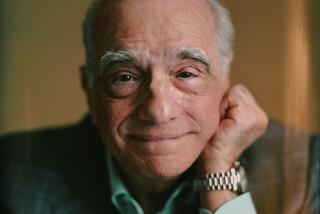‘Rosetta’ Is an Unsparing Look at Young Woman’s Difficult Life
“Rosetta” grabs you by the throat and won’t let go. It’s a killer of a film about a desperate young woman, someone we’re both terrified by and for, yet it’s so finely empathetic and insightful it also tears at your heart. A triumph of humanistic cinema, it won two awards at Cannes, the Palme d’Or for writer-directors Luc and Jean-Pierre Dardenne and a share of the best actress prize for its 18-year-old star, Emilie Dequenne, and both couldn’t be more deserved.
“Rosetta” is the latest film by the Dardenne brothers, who, after spending decades making some 60 documentaries in their native Belgium, astonished the film world with their multiple award-winning 1996 film, “La Promesse,” which details how the 15-year-old son of a ruthless father comes to discover the existence and importance of morality.
Aside from being savagely unsentimental, both films share a passionate concern for what it means to be poor and disadvantaged. And both explore the great and gripping drama inherent in reconnecting people to their core humanity, as well as the difficulty of reintegrating society’s outcasts into a society that has completely rejected them.
Without prologue or preamble, “Rosetta” thrusts us immediately into its protagonist’s furious world. Red-faced, breathing heavily, a look of mixed anguish and aggression on her face, Rosetta hurls herself down a factory hallway, angry at the world in general and at her supervisor in particular. He’s just fired her from a short-term provisional job, and she is so completely enraged it takes several policemen to remove her from the premises.
Precisely because it’s tempting to ask, “Why care so much about a simple job?,” “Rosetta” spends the rest of its intense 95 minutes in effect answering that question. With devastating emotional impact it explores how much it can mean to those outside the circle to simply have a job, how strong a basic human desire it is to be productive, to take one’s place as an ordinary working person.
To help us more completely understand Rosetta’s situation, what she is capable of in pursuit of her unlikely but all-important dream, Alain Marcoen’s hand-held cinematography (Benoit Dervaux was the operator) shadows her like a second skin. Implacable, pitiless, the camera is so close to Rosetta, often literally in her face, that we feel for her and share in her life because the insistent visuals simply leave us no choice.
What we see up close is a sullen, closed-off young person, abrupt to everyone and counting on nothing from life but trouble and despair. Her fury, determination and need are almost unbearable, and it’s painful to imagine (the film doesn’t tell us) what life has done to this young woman to make her this way. What we see finally is a kind of small, determined animal, a ferret perhaps, always wary and watchful. Peering around corners to see if it’s safe to emerge, lashing out at anything and anyone who comes too close, Rosetta takes refuge in increasingly desperate daily rituals like hiding her boots in a storm drain when she goes to the city and fishing for food with makeshift equipment.
*
Rosetta lives in a run-down trailer park outside the Belgian city of Seraing with her terminally alcoholic, sleep-around mother (Anne Yernaux), who in rare moments of sobriety repairs clothes that Rosetta sells. More than anything, the daughter lives in terror of descending into complete oblivion like her wastrel mother, and, in her graphic words, “falling into the rut.”
Rosetta’s coldness and distance are always daunting. Yet it is the gift of Dequenne’s magical acting and the Dardennes’ masterful and sure-handed writing and directing that her feral intensity and determination (underlined by the complete absence of music), coupled with the almost biblical spareness of her wants, make her a person we care terribly about.
It’s at a waffle stand that Rosetta makes her first tentative contacts with humanity. Riquet (Fabrizio Rongione), a shy, decent boy who works behind the counter, is fascinated by her difficult nature, and she also makes a positive impression on the stand’s owner (Olivier Gourmet, the father in “La Promesse”). But even with those faint hopes, don’t imagine that life is going to turn into a movie fantasy for Rosetta; the Dardennes have too much skill, and too much integrity, for anything even close to that.
As difficult as Rosetta is, there are moments with her that are indelible. Going to sleep one night, she repeats a devastating mantra to herself: “Your name is Rosetta. My name is Rosetta. You found a job. I found a job. You’ve got a friend. I’ve got a friend.” Simple dreams but so devastatingly difficult to attain.
* MPAA rating: R, for language. Times guidelines: Rosetta’s life is presented with extraordinary intensity.
‘Rosetta’
Emilie Dequenne: Rosetta
Fabrizio Rongione: Riquet
Anne Yernaux: the mother
Olivier Gourmet: the boss
A Les Films du Fleuve/ARP Selection/RTBF production, released by USA Films/October Films. Directors Luc and Jean-Pierre Dardenne. Producers Luc & Jean-Pierre Dardenne and Michele & Laurent Petin. Screenplay Luc & Jean-Pierre Dardenne. Cinematographer Alain Marcoen. Editor Marie-Helene Dozo. Costumes Monic Parelle. Sound Jean-Pierre Duret. Art director Igor Gabriel. Running time: 1 hour, 35 minutes.
Exclusively at the Nuart, 11272 Santa Monica Blvd., West Los Angeles, (310) 478-6379.
More to Read
Only good movies
Get the Indie Focus newsletter, Mark Olsen's weekly guide to the world of cinema.
You may occasionally receive promotional content from the Los Angeles Times.











